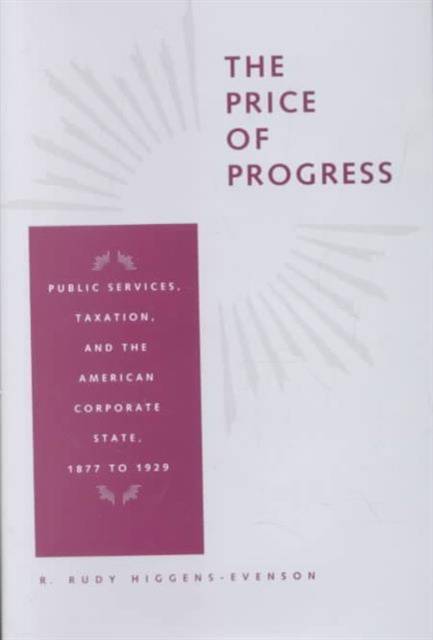
- Retrait gratuit dans votre magasin Club
- 7.000.000 titres dans notre catalogue
- Payer en toute sécurité
- Toujours un magasin près de chez vous
- Retrait gratuit dans votre magasin Club
- 7.000.000 titres dans notre catalogue
- Payer en toute sécurité
- Toujours un magasin près de chez vous
The Price of Progress
Public Services, Taxation, and the American Corporate State, 1877 to 1929
R Rudy Higgens-EvensonDescription
Between the Civil War and the Great Depression, twin revolutions swept through American business and government. In business, large corporations came to dominate entire sectors and markets. In government, new services and agencies, especially at the city and state levels, sprang up to ameliorate a broad spectrum of social problems. In The Price of Progress, R. Rudy Higgens-Evenson offers a fresh analysis of therelationship between those two revolutions.
Using previously unexploited data from the annual reports of state treasurers and comptrollers, he provides a detailed, empirical assessment of the goods and services provided to citizens, as well as the resources extracted from them, by state governments during the Gilded Age and Progressive Era.Focusing on New York, Massachusetts, California, and Kansas, but including data on 13 other states, his comparative study suggests that the "corporate state" originated in tax policies designed to finance new and innovative government services.
Business and government grew together in a surprising and complex fashion. In the late nineteenth century, services such as mental health care for the needy and free elementary education for all children created new strains on the states' old property tax systems. In order to pay for newly constructed state asylums and schools, states experimented for the first time with corporate taxation as a source of revenue, linking state revenues to the profitability of industries such as railroads and utilities. To control their tax bills, big businessesintensified lobbying efforts in state legislatures, captured important positions in state tax bureaus, and sponsored a variety of government-efficiency reform organizations. The unintended result of corporate taxation--imposed to allow states to fulfill their responsibilities to their citizens--was the creation of increasingly intimate ties between politicians, bureaucrats, corporate leaders, and progressive citizens. By the 1920s, a variety of "corporate states" had proliferated across the nation, each shaped by a particular mix of taxation and public services, each offering a case study in how the business of America, as President Calvin Coolidge put it, became business.
Spécifications
Parties prenantes
- Auteur(s) :
- Editeur:
Contenu
- Nombre de pages :
- 184
- Langue:
- Anglais
- Collection :
Caractéristiques
- EAN:
- 9780801870545
- Date de parution :
- 15-01-03
- Format:
- Livre relié
- Format numérique:
- Genaaid
- Dimensions :
- 163 mm x 240 mm
- Poids :
- 390 g







